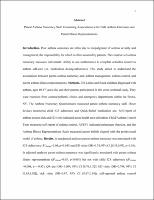Please use this identifier to cite or link to this item:
https://hdl.handle.net/20.500.12202/6914| Title: | Parent Asthma Numeracy Skill: Examining Associations with Child Asthma Outcomes and Parent Illness Representations |
| Authors: | Feldman, Jonathan M. Arcoleo, Kimberly Weinberger, Andrea H Lehrer, Paul Gonzalez, Jeffrey S Kaur, Karenjot |
| Keywords: | clinical psychology Acute healthcare utilization Asthma illness representations Medication adherence Parent asthma numeracy skill Pulmonary function |
| Issue Date: | May-2021 |
| Citation: | Kaur, K. (2021, May). Parent Asthma Numeracy Skill: Examining Associations with Child Asthma Outcomes and Parent Illness Representations (Publication No. 28644576) [Doctoral dissertation, PhD, Yeshiva University]. ProQuest Dissertation and Theses Global. |
| Abstract: | Introduction. Poor asthma outcomes are often due to misjudgment of asthma severity and management, the responsibility for which is often assumed by parents. The construct of asthma numeracy measures individuals’ ability to use mathematics to complete activities related to asthma self-care (ex. medication dosing/adherence). This study aimed to understand the associations between parent asthma numeracy and: asthma management, asthma control, and parent asthma illness representations. Methods. 236 Latinx and Black children diagnosed with asthma, ages 10-17 years old, and their parents participated in this cross-sectional study. They were recruited from asthma/pediatric clinics and emergency departments within the Bronx, NY. The Asthma Numeracy Questionnaire measured parent asthma numeracy skill. Doser devices monitored child ICS adherence and Quick-Relief medication use. Self-report of asthma-related sick and ED visits indicated acute health care utilization. Child/Asthma Control Tests measured self-report of asthma control, %FEV1 indicated pulmonary function, and the Asthma Illness Representations Scale measured parent beliefs aligned with the professional model of asthma. Results. In unadjusted analyses parent asthma numeracy was associated with ICS Adherence (R2change=0.04, p=0.045) and ED visits (OR=0.74, 95% CI [0.59,0.93], p=0.01). In adjusted analyses parent asthma numeracy was significantly associated with parent asthma illness representations (R2change=0.05, p<0.001) but not with child ICS adherence (R2change =0.008, p = 0.83), QR use (OR=1.004, 95% CI [0.76,1.32]) ED visits (OR=0.798, 95% CI [0.63,1.02]), sick visits (OR=0.87, 95% CI [0.67,1.14]), self-reported asthma control (OR=0.99, 95% CI [0.79,1.23]), or pulmonary function (R2change=0.0, p=0.82). Exploratory analyses revealed child age was a moderator in the relationship between parent asthma numeracy and child QR use. Conclusion. As hypothesized, greater parent asthma numeracy skill was significantly associated with parents having views of asthma more closely aligned with the professional model of asthma management. This study also revealed a trend regarding greater parent asthma numeracy being associated with decreased likelihood of child ED visits. These findings are unique and may be suggestive of the clinical utility of the ANQ as a screening tool for illness representations. It provides a basis for clinical interventions to address the construct of asthma numeracy with the goal of improving child asthma management and clinical outcomes |
| Description: | Doctoral dissertation, PhD / Open Access |
| URI: | https://hdl.handle.net/20.500.12202/6914 https://ezproxy.yu.edu/login?url=https://www.proquest.com/dissertations-theses/parent-asthma-numeracy-skill-examining/docview/2557836842/se-2 |
| Appears in Collections: | Ferkauf Graduate School of Psychology: Doctoral Dissertations |
Files in This Item:
| File | Description | Size | Format | |
|---|---|---|---|---|
| Karenjot Kaur Parent Asthma Ferkauf OA 2021 Ferkauf PhD.pdf | 1.08 MB | Adobe PDF |  View/Open |
This item is licensed under a Creative Commons License

